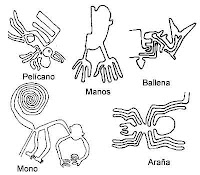LOCATION 
was developed in the area bounded by the valleys of Chincha, Pisco, Ica, Rio Grande (Nazca), Acari and Mill Valley. DISCOVERER
Federico Max Uhle in 1901. CHRONOLOGY
100 AD. - 700 AD. Or so. GENERAL
Its earliest record found in early stages of Paracas - Ocucaje.
Considered the best astronomers and painters of ancient Peru. They had a military state.
base its economy was in agriculture.
Geoglyphs Importance of Nazca.
SOCIAL ORGANIZATION
militarist state, aristocratic and warrior. They were headhunters
trophy. Its capital was Cahuachi
, considered as the main administrative and religious center of the Nazca. ECONOMIC ORGANIZATION
based primarily on agriculture.
Like the Moche performed hydraulic engineering due to very dry habitat.
Considered the best hydraulic engineers of ancient Peru.
were developed in the trade, extending their relationships into the jungle, Ayacucho and the Collao. CULTURAL ASPECTS
excel in ceramics (Painters), astronomy (Geoglifos), hydraulic engineering (aqueducts), architecture (Cahuachi). CERAMIC
are the best painters of ancient Peru.
finest ceramics were eminent artists. Technical
abhors a vacuum (total paint).
is polychrome handle bridge divergent beak, globular form. They used more than fifteen
colors. ASTRONOMY
are considered the best astronomers. Evidence
possible Nazca lines, discovered Xesspe Toribio Mejia (1927).
Among the performances are: according to Mejia Xesspe ceques or roads are ceremonial, as would a zodiac Paul Kosok Andes, according to Maria Reiche would be an agricultural calendar. Current theory: an area of \u200b\u200breligious rites. ARCHITECTURE
They used the rectangular adobe, are considered creators of the city (Cahuachi, the oldest).
Cahuachi is realized in human sacrifice. RELIGION
supreme God, a being anthropomorphic (cat, fish and poultry).
were hunter gatherers, hunters of trophy heads.
human sacrifices.

NAZCA LINES
were studied by Maria Reiche.
paths are geoglyphs on the desert plains.
These sets of lines and fills, triangular and rectangular with more than one hundred drawings in spiral designs ornitomorfos including 18, 10 zoomorfo with representations of fish, a monkey, a spider, a number of anthropomorphic figures and other difficult to identify .

was developed in the area bounded by the valleys of Chincha, Pisco, Ica, Rio Grande (Nazca), Acari and Mill Valley. DISCOVERER
Federico Max Uhle in 1901. CHRONOLOGY
100 AD. - 700 AD. Or so. GENERAL
Its earliest record found in early stages of Paracas - Ocucaje.
Considered the best astronomers and painters of ancient Peru. They had a military state.
base its economy was in agriculture.
Geoglyphs Importance of Nazca.
SOCIAL ORGANIZATION
militarist state, aristocratic and warrior. They were headhunters
trophy. Its capital was Cahuachi
, considered as the main administrative and religious center of the Nazca. ECONOMIC ORGANIZATION
based primarily on agriculture.
Like the Moche performed hydraulic engineering due to very dry habitat.
Considered the best hydraulic engineers of ancient Peru.
were developed in the trade, extending their relationships into the jungle, Ayacucho and the Collao. CULTURAL ASPECTS
excel in ceramics (Painters), astronomy (Geoglifos), hydraulic engineering (aqueducts), architecture (Cahuachi). CERAMIC
are the best painters of ancient Peru.
finest ceramics were eminent artists. Technical
abhors a vacuum (total paint).
is polychrome handle bridge divergent beak, globular form. They used more than fifteen
colors. ASTRONOMY
are considered the best astronomers. Evidence
possible Nazca lines, discovered Xesspe Toribio Mejia (1927).
Among the performances are: according to Mejia Xesspe ceques or roads are ceremonial, as would a zodiac Paul Kosok Andes, according to Maria Reiche would be an agricultural calendar. Current theory: an area of \u200b\u200breligious rites. ARCHITECTURE
They used the rectangular adobe, are considered creators of the city (Cahuachi, the oldest).
Cahuachi is realized in human sacrifice. RELIGION
supreme God, a being anthropomorphic (cat, fish and poultry).
were hunter gatherers, hunters of trophy heads.
human sacrifices.

NAZCA LINES
were studied by Maria Reiche.
paths are geoglyphs on the desert plains.
These sets of lines and fills, triangular and rectangular with more than one hundred drawings in spiral designs ornitomorfos including 18, 10 zoomorfo with representations of fish, a monkey, a spider, a number of anthropomorphic figures and other difficult to identify .
0 comments:
Post a Comment